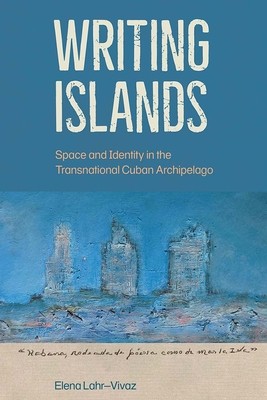
- We will send in 10–14 business days.
- Author: Elena Lahr-Vivaz
- Publisher: University of Florida Press
- ISBN-10: 1683403290
- ISBN-13: 9781683403296
- Format: 15.2 x 22.9 x 1.4 cm, softcover
- Language: English
- SAVE -10% with code: EXTRA
Reviews
Description
Howcontemporary Cuban writers build transnational communities In Writing Islands, Elena
Lahr-Vivaz employs methods from archipelagic studies to analyze works of
contemporary Cuban writers on the island alongside those in exile. Offering a
new lens to explore the multiplicity of Cuban space and identity, she argues
that these writers approach their nation as part of a larger, transnational
network of islands. Introducing the term "arcubiélago" to describe the spaces
created by Cuban writers, both on the ground and in print, Lahr-Vivaz
illuminates how transnational communities are forged and how they function
across space and time. Lahr-Vivaz
considers how poets, novelists, and essayists of the 1990s and 2000s built
interconnected communities of readers through blogs, state-sponsored book
fairs, informal methods of book circulation, and intertextual dialogues. Book
chapters offer in-depth analyses of the works of writers as different as Reina
MarÃa RodrÃguez, known for lyrical poetry, and Zoé Valdés, known for strident
critiques of Fidel Castro. Incorporating insights from on-site interviews in
Cuba, Spain, and the United States, Lahr-Vivaz analyzes how writers maintained
connections materially, through the distribution of works, and metaphorically,
as their texts bridge spaces separated by geopolitics. Through
a decolonizing methodology that resists limiting Cuba to a distinct geographic
space, Writing Islands investigates
the nuances of Cuban identity, the creation of alternate spaces of identity,
the potential of the Internet for artistic expression, and the transnational
bonds that join far-flung communities. Publication
of this work made possible by a Sustaining the Humanities through the American
Rescue Plan grant from the National Endowment for the Humanities.
EXTRA 10 % discount with code: EXTRA
The promotion ends in 20d.20:40:37
The discount code is valid when purchasing from 10 €. Discounts do not stack.
- Author: Elena Lahr-Vivaz
- Publisher: University of Florida Press
- ISBN-10: 1683403290
- ISBN-13: 9781683403296
- Format: 15.2 x 22.9 x 1.4 cm, softcover
- Language: English English
contemporary Cuban writers build transnational communities In Writing Islands, Elena
Lahr-Vivaz employs methods from archipelagic studies to analyze works of
contemporary Cuban writers on the island alongside those in exile. Offering a
new lens to explore the multiplicity of Cuban space and identity, she argues
that these writers approach their nation as part of a larger, transnational
network of islands. Introducing the term "arcubiélago" to describe the spaces
created by Cuban writers, both on the ground and in print, Lahr-Vivaz
illuminates how transnational communities are forged and how they function
across space and time. Lahr-Vivaz
considers how poets, novelists, and essayists of the 1990s and 2000s built
interconnected communities of readers through blogs, state-sponsored book
fairs, informal methods of book circulation, and intertextual dialogues. Book
chapters offer in-depth analyses of the works of writers as different as Reina
MarÃa RodrÃguez, known for lyrical poetry, and Zoé Valdés, known for strident
critiques of Fidel Castro. Incorporating insights from on-site interviews in
Cuba, Spain, and the United States, Lahr-Vivaz analyzes how writers maintained
connections materially, through the distribution of works, and metaphorically,
as their texts bridge spaces separated by geopolitics. Through
a decolonizing methodology that resists limiting Cuba to a distinct geographic
space, Writing Islands investigates
the nuances of Cuban identity, the creation of alternate spaces of identity,
the potential of the Internet for artistic expression, and the transnational
bonds that join far-flung communities. Publication
of this work made possible by a Sustaining the Humanities through the American
Rescue Plan grant from the National Endowment for the Humanities.


Reviews